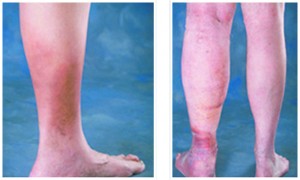By Tom Tran PA-C, MPAs, NCCPA Surgery Board Certified –
 In the US, over 13% of the population is affected by leg swelling. It costs over 200 million dollars a year to treat and manage this debilitating condition. It can affect your lifestyle, cause pain, infections, skin color changes, blisters, cramping and tired, achy legs.
In the US, over 13% of the population is affected by leg swelling. It costs over 200 million dollars a year to treat and manage this debilitating condition. It can affect your lifestyle, cause pain, infections, skin color changes, blisters, cramping and tired, achy legs.
Common Causes of Leg Swelling
There are many causes of leg swelling.
Some of the more common ones include:
- Congestive Heart Failure
- Venous Insufficiency or Varicose Veins
- Medications
- Obesity
- Trauma
- Blood Clots
- Electrolyte Imbalance
- Kidney Problems
- Infections
- Skin Diseases
Tests to Determine Cause
In order to treat and manage your leg swelling, the causative factor needs to be determined. It starts with going to your primary care provider or a leg swelling specialist to first identify what initially caused your leg swelling. From then, the appropriate tests need to be done to rule out certain causes. One example is a specific test of your veins called a reflux study done at a dedicated vein center. This test is highly specific because it gives information about how much blood is pooling in your veins, if you ever had a blood clot, and what your deep and superficial veins look like. Ultrasounds done at hospitals or a non-dedicated vein center will only show if you have a blood clot or not. There are many other tests, including: labs, xrays, CT scans, MRI, and other invasive dye studies. However, ultrasound is non-invasive and cost effective to rule out an easily correctable underlying vein disease. To avoid costly expenses to the patient, these tests need to be properly ordered by your provider or specialist in leg swelling.
Treatment Options
Once a cause is identified, treating your swelling has many factors. One common practice from many practitioners is to prescribe a diuretic for leg swelling. For some conditions such as Congestive Heart Failure, diuretics work well. For others, it will not work at all and will be more problematic than helpful. The usual leg elevation, swimming pool exercises, compression stockings, and appropriate skin care helps and prevents complications. Whatever the treatment options are, the appropriate diagnosis needs to first be made.
Vein Disease May Cause Leg Swelling
One of the most missed evaluations of leg swelling is being able to recognize that an underlying vein disease is causing the problem. Veins bring blood back to the heart. If your veins are damaged from genetics, obesity, pregnancy, standing or sitting a lot for work, wearing high heels, and blood clots, then you will have blood pooling in your legs.
Start with contacting your Primary Care Provider or visiting Comprehensive Vein Center at the Villages where they treat vein disease and consult on many patients with leg swelling to rule out an underlying vein cause. They offer a detailed ultrasound examination of your veins in the legs, educate you about your anatomy and go over the specific results to corroborate care for your condition. If you do not have an underlying vein disease that is causing your leg swelling, they are able to refer you to their vast specialist network that they work closely with to help treat and manage your condition.
Contact Comprehensive Vein Center at the Villages at 352-259-5960, or visit us online at www.thecvc.net.
 Central Florida Health and Wellness Magazine Health and Wellness Articles of the Villages
Central Florida Health and Wellness Magazine Health and Wellness Articles of the Villages



